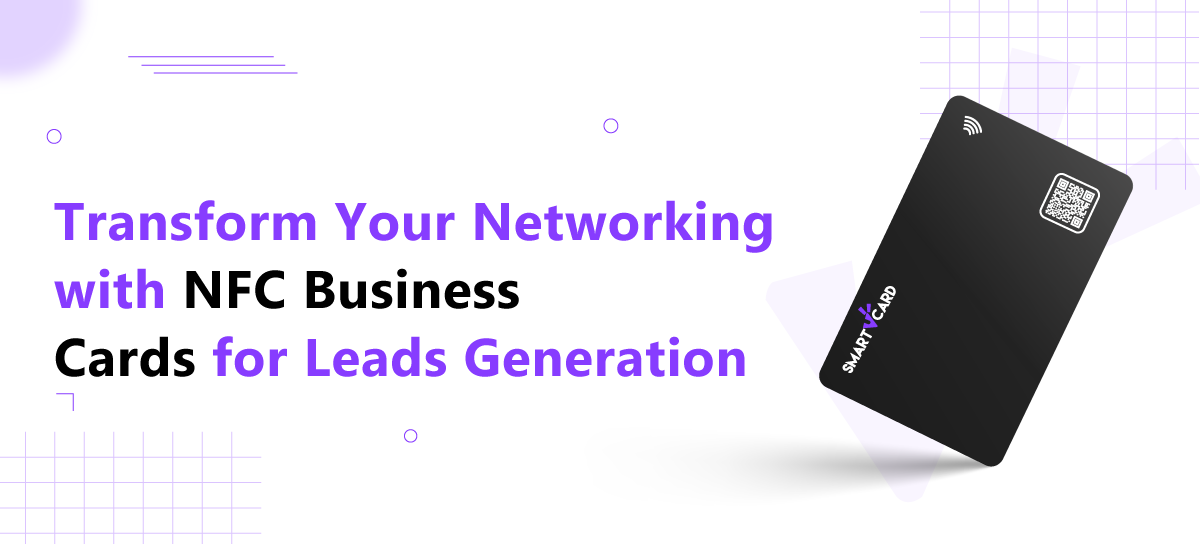Transform Your Networking with NFC Business Cards for Leads Generation

What are NFC Business Cards?
NFC business cards are embedded with a small, passive chip that can transmit information to a compatible device when brought into close proximity. Unlike traditional business cards, which only provide static information, NFC cards can offer dynamic content, instantly transmitting contact details, websites, social media profiles, portfolios, and much more with a simple tap. This seamless interaction not only impresses the recipient but also opens up a new realm of possibilities for generating leads.
Instant Information Sharing
A major advantage of NFC business cards is their capacity for instant information sharing. In a world where time is a precious commodity, the ability to transfer contact information with a single tap saves valuable time for both parties. There is no need for manual entry of details, reducing the risk of errors and ensuring that your information is always accurately recorded.
Eco-Friendly Alternative
In an era where sustainability is a priority, digital business cards offer an eco-friendly alternative to paper cards. The production of paper business cards consumes natural resources and generates waste. Digital cards on the other hand, eliminate the need for physical materials, reducing the environmental impact. By adopting digital business cards, professionals can contribute to sustainability efforts and appeal to eco-conscious clients and partners.
Enhanced Engagement
NFC business cards can include links to multimedia content, such as videos, presentations, or even a personalized welcome message. This enhanced engagement can leave a lasting impression on potential leads, making them more likely to remember you and your business. By providing an interactive experience, you can stand out in a crowded marketplace and foster stronger connections with prospects.
Easy Updates and Customization
Traditional business cards can become outdated quickly as contact details or job roles change. NFC business cards, however, can be easily updated with new information without the need to reprint physical cards. This flexibility ensures that your contacts always have your most current information, fostering better communication and reducing the likelihood of missed opportunities.
Tracking and Analytics
One of the most compelling features of NFC business cards is the ability to track interactions. With traditional cards, it’s challenging to know if your card ended up in a drawer or the trash. NFC cards, on the other hand, can provide valuable insights into how and when your card is being used. This data can inform your networking strategy, helping you understand which events or interactions are most effective and adjusting your approach accordingly.
Including NFC Business Cards in Your Network Building Approach
It’s crucial to incorporate NFC business cards into your larger networking strategy in order to take full advantage of their potential. Here are some doable actions to get you going:
- Choose the Right Platform and Provider: There are several providers of NFC business cards, each offering different features and customization options. Find a service who fits your demands and budget by doing some research. . Ensure that the platform you choose offers analytics and easy updating features.
- Design with Purpose: Your NFC business card should reflect your brand identity. Work with a designer to create a visually appealing card that includes your logo, brand colors, and a professional layout. Remember, the physical appearance of the card still matters in making a first impression.
- Prepare Your Digital Content: Think about what information you want to share via your NFC card. This could include your contact details, links to your website and social media profiles, a portfolio, or even a video introduction. Ensure that all links are up-to-date and that your digital content is polished and professional.
- Educate Your Recipients: While NFC technology is becoming more common, not everyone may be familiar with how it works. Be prepared to explain how to use the card and the benefits it offers. A brief demonstration can go a long way in ensuring that your card is used effectively.
5. Follow-Up: After exchanging NFC business cards, follow up with your new contacts. A quick email or LinkedIn message referencing your interaction can reinforce your connection and keep the conversation going.
Real-World Applications and Success Stories
Several industries are already reaping the benefits of NFC business cards. For example, in real estate, agents can share property listings and virtual tours instantly with potential buyers. In the tech industry, professionals can provide links to their GitHub repositories or latest projects. At conferences and networking events, NFC business cards can streamline the exchange of information, making it easier to connect with a larger number of people efficiently.
One success story involves a marketing agency that adopted NFC business cards for its sales team. By embedding links to case studies, testimonials, and portfolio pieces, the agency provided potential clients with instant access to their work. This approach not only impressed prospects but also increased the agency’s lead conversion rate by 25%.
Future Prospects
As technology continues to evolve, the capabilities of NFC business cards are likely to expand. Future developments could include integration with augmented reality (AR), allowing users to experience a virtual tour of a product or service. Additionally, advancements in data security will further enhance the reliability and trustworthiness of NFC interactions.
Conclusion
NFC business cards are more than just a technological gimmick; they represent a significant step forward in the way we network and generate leads. By providing instant information sharing, enhanced engagement, easy updates, and valuable tracking insights, NFC business cards offer a modern, efficient, and impactful way to connect with potential clients and partners. Embracing this technology can set you apart in a competitive market, transforming your networking efforts and driving better leads.
